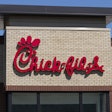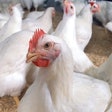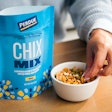
The demand for plant-based alternatives to animal proteins is growing, fueled by the consumer interest in going meat free and the notion that the alternative is healthier and more sustainable. In 2018, the global meat substitutes market held a retail value of $18.6 billion, up 10.4 percent on the previous year, according to Euromonitor International.
In the past five years, growth of meat alternatives has outpaced that of regular meat — an important development despite coming from a smaller base, says Tom Rees, industry manager for food and nutrition at Euromonitor International.
The prospect of expansion within the alternative protein category threatens to take market share from animal meat consumption. This article offers a glimpse into the meat-free mindset and highlights how the animal protein industry can reframe this trend.

The rise of veganism, vegetarianism and flexitarianism is changing the way consumers eat. (mediaphotos | iStock.com)
Consumers opt for plant-based ‘meats’
What's driving the trend toward plant-based meat alternatives?
Rees says health concerns around meat consumption, particularly red meat, have “really cut through” and, more recently, the environmental aspect has tipped many consumers off the fence.
More consumers believe they can make a difference to the planet's future through their own actions, he says, particularly millennials and digital natives who have grown up seeing impact immediately online.
However, Rees notes that not all consumers are shifting to vegan or vegetarian diets — many are becoming “flexitarian,” flitting between meat and non-meat foods, inspired by campaigns like Meatless Monday or Veganuary — and meat-free sentiments remain isolated to developed markets.
“It's still true that in China and India, where the market for meat or any consumer good is absolutely vast, the idea that eating meat and having access to meat is linked to status is still important,” he says.
For those opting to go meat-free, Ryan Alexander, co-founder of No Meat May – a campaign encouraging consumers to give up meat for the month – says there are four reasons: health, animal welfare, food security and the environment.
Consumers are also buying more plant-based meats as the taste and texture have improved. In the past two decades, plant-based products made using soy, tofu or seitan, have evolved hugely, says Kurt Schmidinger, founder of Future Food - Meat Without Livestock, and will continue to do well as technologies advance.
Also driving the popularity, a handful of meat-alternative producers are now well-funded with a strong media presence, Schmidinger notes, citing Impossible Foods, famed for its bleeding burger; Beyond Meat, backed by Bill Gates and Leonardo DiCaprio; and Omnipork with Chinese celebrity endorsements.

Some believe “clean” or lab-grown meat is the future, but will consumers bite? (KarinaKnyspel | iStock.com)
Clean meat 'takeover'?
Running parallel to the popularity of plant-based protein alternatives, a host of cultured meat startups have entered the fold, backed by investors and novel innovations.
Cultured meat innovation is rooted in startups — the likes of Super Meat, Meat the Future, Mosa Meat and JUST Meat — and holds great promise, says Xavier Speeleveld, futurist and co-founder of The Argonauts.
“Cultured or lab-grown meat is new — it's alien, it's unusual,” Speeleveld says. “In my opinion, in a couple of decades, it will be perfectly normal to grow a piece of meat in our kitchen.”
For now, plant-based alternatives offer the “intermediary step,” he says, but once cultured meats match on price, taste and everything else, the category should gain attention.
“In the far future — in 15 to 20 years — the big message is that the meat industry must follow this cultured meat trend and invest in it,” Speeleveld says. “Maybe have a program or second line that is lab-grown? ... Knowing the meat industry is a billion-dollar industry, the business that succeeds in serving a proportion of this market will make big money.”
Sarah Lucas, head of strategy and communications at Mosa Meat — the brand fronting Mark Post's world-first cultured hamburger — believes clean meat, rather than plant-based alternatives, is the future, as it draws in a wider consumer group.
“Once we can produce 3-D structures and the price has come down, we believe cultured meat will take over most of the regular meat market,” Lucas says. “There will probably still be consumers who prefer to eat meat from a real cow, but we think this will be a minority.”
She suggests cultured meat trumps regular meat on human health benefits, animal welfare and its limited environmental impact, e.g. reducing greenhouse gas emissions by 96 percent.
Mosa Meat will launch its products in Europe within four years and predicts cultured meat will be competitively priced within 10 years.
More food choice, appropriate regulation
While there are not hard figures identifying the amount of market share animal meats can lose to plant-based or cell-cultured alternatives, some large corporations have already decided to diversify, says Louise Calderwood, director of regulatory affairs at the American Feed Industry Association (AFIA).
Tyson and Cargill, for example, have made investments in the developing sector.
“With a growing world population and an increased demand for nutritious protein, we must take an 'all-of-the-above' approach to these types of alternatives,” Calderwood says. “While AFIA does not have an official policy on plant-based or cultured-meat alternatives, we stand by our position that consumers should have access to more food choices in the marketplace and continue to call upon regulators to move forward with an appropriate, science-based approach to regulating these food products.”
In November last year, the U.S. Department of Agriculture and Food and Drug Administration agreed to share regulation of cell-cultured food production and labeling, although full details have yet to be disclosed.
In the meantime, Calderwood says as the world's population triples in the next 30 years and meat demand continues to grow, what will be important is continued innovation around ingredients for animal health, technologies to improve sustainability, and strategies to meet the challenges of environmental stewardship and access to nutritious food globally.
Márcio Caparroz, secretary general of the International Beef Alliance (IBA), agrees this is of great importance moving forward.
Global cattle producers are well aware of the trends and challenges associated with the rise of meat alternatives, Caparroz says, and will work hard to enhance beef's “natural protein story.”
“While plant-based diets have become trendy in recent years, it is vital we remember the benefits that both animal and plant-based proteins have to offer and how they work ideally together,” he says. “Beef is a highly efficient protein source for iron and zinc, vastly superior to equivalent plant-based foods. We welcome any competition that is fair, based on science and not misleading consumers, in order to enable options for the marketplace.”

















